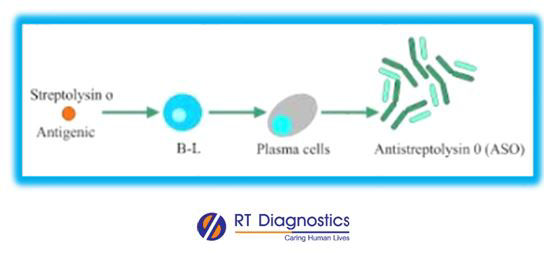ASO
ASO Antibody – Anti-streptolysin is an antibody that attacks the antigen known as ‘STREPTOLYSIN-O’ which is produced by Bacteria A Streptococcus but due to similarity of antigenicity the immune response is also triggered against self-antigens such as Myocytes. This test evaluates the ASO antibody in the blood to examine if the patient was previously exposed to Strep Infections, later leading to complications such as Rheumatic Fever or Glomerulonephritis (Kidney Disorder).
ASO ANTIBODY – ANTI-STREPTOLYSIN:
Why the Anti-Streptolysin Antibody test?
CLINICAL INFORMATION :
Anti-Streptolysin Antibody Test is a blood test that checks for toxin known as streptolysin-O during Group-A Streptococcus (GAS) bacterial infection. Symptoms include strep throat, Scarlet fever, chest pain, fatigue, shortness of breath, palpitation, joint pain, small painless nodules under the skin, Sydenham’s chorea (rapid and jerky moments), edema (fluid accumulation) which can lead to hypertension, dark urine, reduced urine output, bloody urine, etc. Complications include post-streptococcal complications such as bacterial endocarditis, kidney disease due to glomerulonephritis, and rheumatic fever that causes damage to the heart valves. Other confirmatory tests for Streptococcal infection apart from ASO antibody tests include anti-DNase B (confirmatory test).

General instructions:
Sample Requirement: Specimen - Blood sample collected from the vein. Test Preparation: 6 Hours of fasting.
NOTE - Sample for specimen collections may vary based on the patient’s condition/cases according to the patient’s presenting complaints/signs or symptoms:
SPECIMEN REQUIREMENT (Special or Rare Cases) - As instructed and guided by Physician / Clinician / Pathologist / as per Laboratory’s requirements, according to procedures and protocols.
This Multi-Specialty Clinical Referral Laboratory RTDIAGNOSTICS provides precise and accurate tests with an extensive range of testing services to the medical centers to help in the diagnosis and identification of pathology in the test specimens for infectious diseases and also to evaluate the function of organ systems of the patient. It prevents further complications and helps to stabilize and restore health to near normalcy at the earliest without delay.



